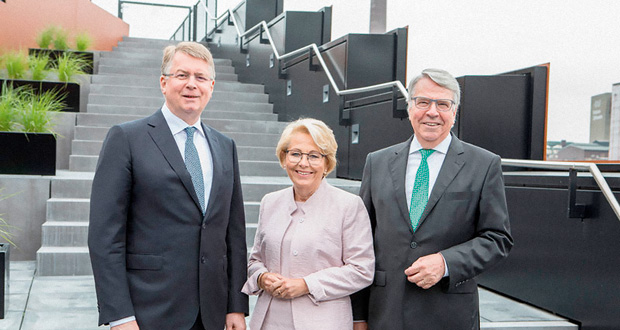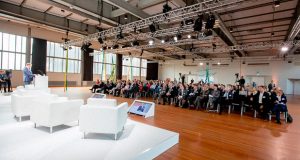In its tenth anniversary year, the RAG-Stiftung, Essen/Germany, can look back on another successful financial year. At its annual press conference, which was held for the first time at the new headquarters of the RAG-Stiftung and RAG Aktiengesell-schaft at the Zollverein UNESCO World Heritage Site in Essen, the foundation’s Board of Executives (Figure 1) reported on the business developments of the past fiscal year and provided an insight into what the future might hold without a coal mining industry in Germany. Accompanying reports also rate the risk of heave-related damage as extremely low. On this basis, RAG is confident that no damage of any kind will arise. The company has announced that there is no need to make use of the subsidence compensation wavers previously agreed by home-owners in land registries.
At the start of the annual press conference, Bernd Tönjes, who became the Chairman of the RAG-Stiftung’s Board of Executives on 24th May 2018, once again expressed recognition for his predecessor: “Dr. Werner Müller and his outstanding life achievement have my wholehearted respect. As the founding father of the RAG-Stiftung, he leaves behind a great legacy. It is incumbent upon me and my colleagues on the Board of Executives to continue along the path he has defined.”
The RAG-Stiftung is well-positioned to master the tasks that lie ahead. At the start of 2019, it will make the first payment honouring the perpetual obligations of the German coal mining industry. To fulfil these obligations, the foundation will reliably generate the necessary income from its assets, which amount to more than 17 bn €. “Our responsibility will not end when coal mining is discontinued in Germany – that’s when it will really begin,” reinforces Tönjes, with reference to the impending post-mining era.
In 2017, the foundation’s profit of 430 m € (2016: 393 m €) once again significantly exceeded the estimated annual expenditure for the perpetual obligations, which will amount to approximately 220 m €/a This is the highest annual profit since the foundation’s creation – apart from the surpluses in 2008 and 2013, in which a larger amount of Evonik shares were sold. The total provision for the perpetual obligations amounted to 5.27 bn € at the end of 2017 (2016: 4.84 bn €).
The RAG-Stiftung’s largest source of income is still its high-yielding participation in Evonik Industries AG, which once again contributed more than 360 m € to the foundation’s profits last year through its annual dividend payout. At the same time, the RAG-Stiftung continues to systematically diversify its capital investments. “To date, the foundation has invested more than 40 % of its assets in companies other than Evonik,” reported Chief Financial Officer Helmut Linssen. In addition to its shares in Vivawest, to the value of approximately 1.5 bn €, the foundation has other long-term equity investments totalling 5.9 bn € (as of December 2017). In 2017 alone, the foundation spent almost 1.3 bn € on new capital investments. “In spite of the low-interest environment, it’s still possible to make a profit in the capital market,” said Linssen. The foundation’s rate of return from its other capital investments was also greater than 6 % in 2017.
Bärbel Bergerhoff-Wodopia, Executive Board member responsible for human resources issues and funding activities, praised the miners’ efforts during the run-up to the discontinuation of Germany’s coal mining industry: “They deserve tremendous respect. Although they know that mining will be discontinued at the end of 2018, they still perform their jobs with a high level of motivation, day in day out, and prepare for the closure of their mines.” In the last year of coal mining in Germany, the downsizing of the mining workforce is proceeding in a socially acceptable manner according to plan. The foundation has further stepped up its funding activities. In this way, the foundation, which focuses its funding on educational projects for young people, is living up to its social responsibility in the soon-to-be-former mining regions and helping to make them fit for the future. In 2018, the foundation will spend a total of 16.5 m € on education, science and culture. It is also continuing its support activities for refugees, and through its educational projects it is smoothing the path of young refugees into German society.
The “Glückauf Zukunft!” initiative, greeting the future in the traditional way of German miners, which was launched in 2016 to prepare for the discontinuation of Germany’s coal mining industry, has developed numerous projects and events and is currently heading toward a period of peak activity. Its activities will include street festivals to celebrate miners and the central ceremony of farewell to mining at the Prosper-Haniel mine in December 2018, which will offer further commemoration of achievements of the mining industry. The “Glückauf Zukunft!” initiative has generated significant momentum for the further development of the mining regions – momentum that will continue to have an impact after the end of the coal mining industry. All projects and events organised by the initiative can be found under www.glueckauf-zukunft.de. (RAG-Stiftung/Si.)

